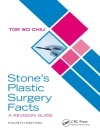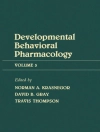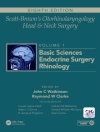Endoscopic Approaches to the Paranasal Sinuses and Skull Base
With the continuing evolution of endoscopic techniques for surgery of lesions of the paranasal sinuses and skull base, and the reduced morbidity associated with this minimally invasive modality, the method has gained widespread use in recent years. This work offers a thorough review of all endoscopic approaches for access to the nose and paranasal sinuses and, through them, to the skull base. Central to this guide is the emphasis on profound knowledge of the complex anatomy in this area, as well as the many vital structures that can be endangered there. To this end, more than 900 full-color images, most photographs from cadaver dissections, are put to brilliant use.
Key Features:
- Internationally renowned specialists and pioneers from Europe and the United States as editors and contributors
- Full-color photos from fresh cadaver dissections illustrate all steps for each approach
- Specific anatomic landmarks as revealed during each step are detailed, providing confidence in spatial orientation
- Correlative CT sections provide crucial additional information
- Risks and potential complications are included, as well as methods to reduce them
Endoscopic Approaches to the Paranasal Sinuses and Skull Base is intended as an indispensable guide for residents, fellows, and specialist surgeons in otolaryngology, neurosurgery, and skull base surgery.
Spis treści
Section 1 Introduction
1 Evolution of Skull Base Surgery: The Multidisciplinary Team Approach
2 Three-Dimensional Anatomy of the Skull Base: The Ventral Pathway
Section 2 Anatomy of the Lateral Nasal Wall and the Paranasal Sinuses
3 Endoscopic Lateral Nasal Wall and Anterior and Posterior Ethmoid Sinus Dissection
4 Frontal Sinus and Draf Approaches
5 Sphenoid Sinus
6 Medial Maxillectomy
7 Anterior and Posterior Ethmoidal Arteries
8 Sphenopalatine and Maxillary Arteries
Section 3 Anterior Cranial Fossa
9 Transcribriform Approach
10 Endoscopic Transtuberculum Transplanum Approach
11 Suprasellar Approach to the Third Ventricle
12 Endoscopic Sellar Approach
13 Cavernous Sinus Approach
14 Endonasal Endoscopic–Assisted Intraorbital Approach
15 Transorbital Neuroendoscopic Approach
Section 4 Middle Cranial Fossa
16 The Anteromedial Corridor via the Expanded Endonasal Approach: The 'Front Door to Meckel’s Cave’
17 Endoscopic Endonasal Approach to Intrapetrous Carotid Artery
18 Anterior Endoscopic Petrosectomy
Section 5 Clivus and Posterior Cranial Fossa
19 Pituitary Gland Transposition and Retrosellar Approach
20 Transclival Approach
21 Endoscopic Approaches to the Craniovertebral Junction
22 The 'Far Medial’ (Transcondylar/Transtubercular) Approach to the Inferior Third of the Clivus
23 Jugular Foramen Approach
Section 6 Pterygopalatine and Infratemporal Fossa
24 Endoscopic Endonasal Approach to Pterygopalatine Fossa
25 Infratemporal Approach
26 Nasopharyngectomy
Section 7 Combined Endoscopic–Transcranial Approaches
27 Transbasal/Subfrontal-Transcribriform Approach to Anterior Skull Base
28 Retrosigmoid-Transclival Approach
29 Far Lateral-Craniovertebral Approach
30 Anterior Transpetrosal Approach versus EEA Transclival Approach
Section 8 Basic Landmarks in Expanded Endoscopic Skull Base Surgery
31 Intracranial Vascular Anatomy
32 Anteromedial Corridors to the Cranial Nerves
33 Bony Landmarks
Section 9 Reconstruction Techniques
34 The Pedicled Nasoseptal Flap
35 Middle and Inferior Turbinate Flaps
36 Anterior and Posterior Pedicle Lateral Nasal Wall Flaps
37 Pericranial and Temporoparietal Fascia Flaps












